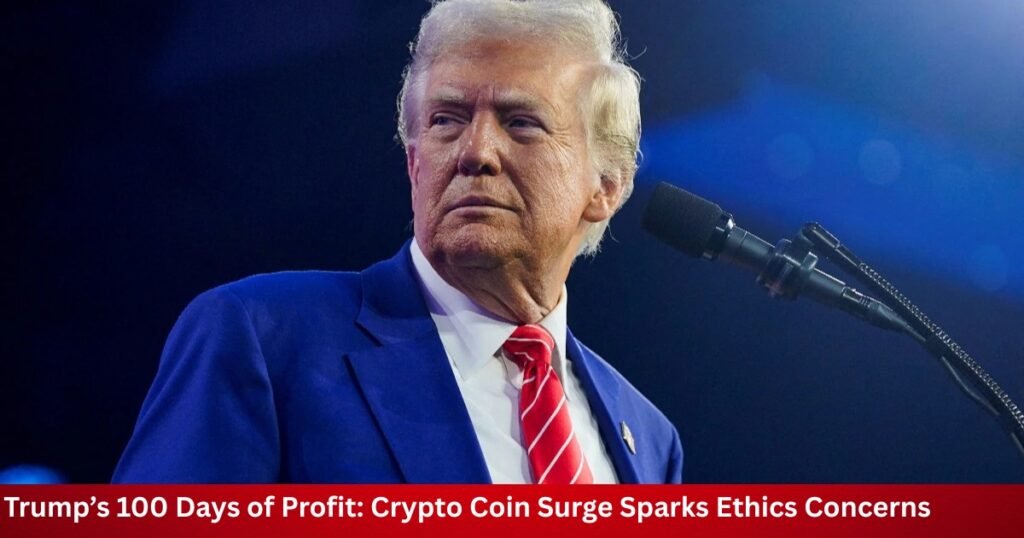
In just 100 days, Donald Trump’s crypto coin venture has reportedly generated millions, raising ethical concerns among the experts. As supporters rush to invest, critics question the transparency and motivations behind the explosive profits.
Let’s learn how Trump’s financial gain intersects with politics, and whether it signals a troubling trend at the crossroads of influence and digital finance.
The Launch of Trump’s Crypto Coin
Donald Trump’s foray into cryptocurrency has garnered significant attention, marked by the launch of two notable digital assets the $TRUMP meme coin and the USD1 stablecoin.
The $TRUMP coin, introduced on January 17, 2025, just before Trump’s second inauguration, quickly surged in value. Within 48 hours, it achieved a market capitalization of nearly $13 billion, with trading volumes approaching $29 billion. The coin’s ownership is concentrated, with 80% held by Trump-affiliated entities. Thus, raising concerns about market manipulation and ethical implications.
In addition to the meme coin, Trump’s venture, World Liberty Financial, launched the USD1 stablecoin, pegged to the U.S. dollar and backed by the U.S. Treasuries and cash equivalents. Therefore, the stablecoin played a central role in a $2 billion investment by Abu Dhabi-based firm MGX into the cryptocurrency exchange Binance. Furthermore, World Liberty Financial is majority-owned by Trump family entities, holding substantial amounts of $WLFI tokens, the platform’s native currency.
Tracking the First 100 Days
In the first 100 days following the launch of Donald Trump’s cryptocurrency ventures, the landscape has been marked by significant finance movements, regulatory shifts, and ethical debates. The key developments after the launch are:
- Regulatory Actions and Appointments: The Trump administration has taken steps to reshape the crypto regulatory environment. Notably, the SEC dropped lawsuits against major crypto firms like Coinbase and Ripple. Additionally, industry proponents such as Howard Lutnick and David Sacks were appointed to significant positions, signaling a pro-crypto stance.
- Ethical Concerns & Scrutiny: The intertwining of Trump’s political influence and personal business ventures in the crypto space has sparked debates over political conflict of interest. Ethics experts and watchdogs have raised questions about transparency and the implications of foreign investments in Trump-affiliated crypto projects.
- Market Performance & Investor Sentiment: Despite the initial hype, the broader crypto market experienced volatility. For example, Bitcoin declined over 10% during this period, reflecting investor concerns over regulatory clarity and the impact of Trump’s crypto initiatives.
Political Figures in Crypto: A Growing Trend
The intersection of politics and cryptocurrency has become increasingly prominent in the U.S., with several political figures actively engaging in the crypto space. Here are some points to learn:
- Senator Cynthia Lummis: The “Crypto Queen”
Senator Cynthia Lummisof Wyoming has been a vocal advocate for Bitcoin, introducing legislation to create a strategic Bitcoin reserve. Her proposals aim to position the U.S. as a leader in digital asset adoption.
- Representative Tom Emmer’s Pro-Crypto Stance
Representative Tom Emmer has consistently championed the crypto industry, opposing stringent regulations and advocating for a more favorable environment for digital assets. He has been instrumental in legislative efforts to support the crypto sector.
- Representative Ritchie Torres’ Advocacy
Representative Ritchie Torres has emerged as a key ally for the crypto industry, criticizing regulatory approaches he views as stifling innovation. His support underscores the bipartisan nature of crypto advocacy in Congress.
Ethical Questions Surrounding Trump’s Financial Involvement
Donald Trump’s cryptocurrency ventures have ignited ethical concerns, mainly regarding potential conflicts of interest and the intertwining of his political roles with personal financial gains.
- Foreign Investments & the Emoluments Clause: World Liberty Financial, a crypto company partially owned by the Trump family, facilitated a $2 billion investment from the UAE-backed firm MGX into Binance using its USD1 stablecoin. Thus, this transaction has drawn scrutiny over potential violations of the U.S. Constitution’s Emoluments Clause. It prohibits federal officials from receiving benefits from foreign states without congressional approval.
- Regulatory Actions: Under the Trump Administration, the Securities and Exchange Commission (SEC) reportedly paused investigations into several crypto companies. Critics argue that this leniency may benefit Trump’s financial interests, especially given his family’s involvement in the crypto sector.
- Exclusive Events for Investors: An exclusive White House dinner was organized by top investors in the $TRUMP coin, offering access based on investment levels. Such events have been criticized as resembling “pay-to-play” politics, where financial contribution may grant privileged access to political figures.
Legal Considerations & Regulatory Grey Areas
Donald Trump’s cryptocurrency ventures have introduced legal complexities and regulatory ambiguities, raising concerns among lawmakers, ethics experts, and the public. Some of the developments highlighting these issues:
- Senator Crypto Bill Faces Bipartisan Turmoil: A pivotal cryptocurrency bill, championed by President Trump, aimed at establishing a federal regulatory framework for stablecoins. It is facing bipartisan challenges in the Senate. Nine Senate Democrats recently withdrew their support, citing concerns over inadequate measures to prevent money laundering and financial system risks. Therefore, the bill’s association with Trump’s crypto interests, including a $2 billion deal involving a Trump-affiliated stablecoin, has intensified scrutiny.
- Deregulation and Conflicts of Interest: Under Trump’s administration, significant deregulation of the cryptocurrency industry has occurred. The Securities and Exchange Commission (SEC) has dropped lawsuits against major crypto firms like Coinbase and Ripple. Furthermore, the Justice Department disbanded its crypto enforcement unit. Critics argue that these actions, coinciding with the Trump family’s expanding crypto ventures, present potential conflicts of interest.
- Environmental and Community Impact of Crypto Mining: The rapid expansion of cryptocurrency mining operations, encouraged by Trump’s pro-crypto policies, has led to environmental and community concerns. In towns like Granbury, Texas, residents have reported noise pollution and increased energy costs due to nearby mining facilities. Thus, the lack of stringent regulations has allowed these operations to proliferate, often at the expense of local communities.
Conclusion
Donald Trump’s crypto ventures reveal a volatile blend of political power, financial ambition, and regulatory uncertainty. As profits soar and scrutiny grows, the ethical and legal implications remain unresolved. Thus, this unfolding story raises urgent questions about transparency, accountability, and the future of political influence in America’s digital financial landscape.



